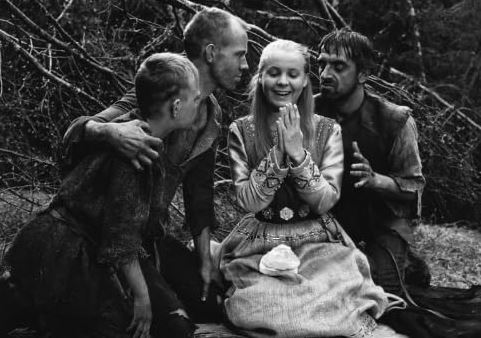
The Virgin Spring (1960)
I’ve always been wary of Ingmar Bergman. Too intellectual and artsy-fartsy, you know? Sometimes I download one of the Swedish auteur’s flicks only to end up deleting it months later, the equivalent of all those times I’ve borrowed War and Peace from the library only to traipse back to return it unread. Recently I realized Bergman did some sort of psychological horror film called Hour of the Wolf. Well, I like horror so maybe that would be a way into his esteemed body of work. Instead I was confronted by a boring load of talky nonsense about some painter and his missus on an island having imaginary encounters with people before discussing Mozart’s The Magic Flute at a boring, talky dinner party that might also have been imaginary. After forty minutes I abandoned ship just like I had with Bergman’s similarly acclaimed Wild Strawberries.
Still, I managed to make it through The Seventh Seal, an existentialist meditation that I found both profound and ridiculous. Suitably emboldened, I put on my big boy pants and tackled one of his best known works, The Virgin Spring. On reflection, perhaps I should’ve started with this one. After all, it is about rape and revenge, a subject matter that has perked up many a groovy flick, such as Death Wish II and Savage Streets. Maybe if I try hard enough I might even be able to imagine a vengeful Bronson armed to the teeth stalking through a Swedish forest. Or would that be cheating?
Spring begins by giving us a perfectly convincing portrait of medieval Christian life on a farm. There’s a semi-stern dad and an anxious mum who both fret over their angelic but somewhat lazy and vain teenage daughter. When given a job ‘in the Holy Virgin’s honor’ of taking candles to a church she struggles to even get out of bed. Before setting off on her journey through the countryside, the father’s last words to her are: “Christ, our Lord, bless this young life.”
The Son of God, however, cocks a deaf ’un and she is instead raped and murdered in a surprisingly graphic attack for a 1960 flick. When the killers inadvertently seek shelter at the farm, it’s not long before they become the architects of their own doom…
As an atheist, I responded to Spring with some hearty nods. It shows that leading an exemplary life while sending your earnest thoughts to a sky-bound deity in a bid to stave off evil is a waste of time. There’s just no rhyme and reason to what goes on down here. What’s more, forgiveness is fine in principle but unworkable in practice. The desire for vengeance (and its accomplishment) is far more natural and understandable. And yet, even when immersed in the random horrors that this world can throw up, the religiously afflicted still can’t abandon their sick pantomime…
The streamlined, Oscar-winning Spring is filled with psychological depth and has proved influential. Sure, there’s some hamminess and self-conscious dialogue here and there, but it’s an accessible ninety minutes and I’m glad I watched. It’s better than stuff like Hour of the Wolf because it mostly lays off the heavy philosophical asides and instead concentrates on telling a juicy story. The lyrical denouement is also a classic example of having your (soggy) cake and eating it.
Leave a Reply